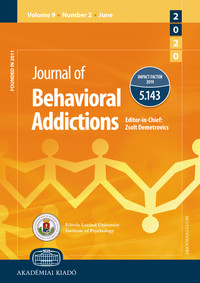Relationship between Internet addiction, susceptible personality traits, and suicidal and self-harm ideation in Chinese adolescent students
Relationship between Internet addiction, susceptible personality traits, and suicidal and self-harm ideation in Chinese adolescent students
Author(s): Li Kuang, Wo Wang, Yan Huang, Xiaorong Chen, Zhen Lv, Jun Cao, Ming Ai, Jianmei ChenSubject(s): Behaviorism
Published by: Akadémiai Kiadó
Keywords: suicidal ideation; Internet; addiction; personality; aggressiveness; adolescent students
Summary/Abstract: Background and aims. Internet addiction (IA) is common among young students. This study aimed to examine the influence and mechanisms of IA and susceptible personality traits on the impact of suicidal ideation in adolescent students in China. Methods. This cross-sectional study (09/2012–09/2015) used stratified cluster sampling with “school type” for stratification; 136,266 students from 63 schools completed the questionnaire. Logistic regression analysis was performed to estimate the effect of IA (Young's Internet Addiction Test) and susceptible personality (Barratt impulsiveness scale, Buss & Perry Aggression Questionnaire; and Eysenck Personality Questionnaire-R Short Scale) on suicidal ideation (Scale of Suicidal Ideation). Results. Suicidal ideation was observed in 20,218 (14.77%) of the students, and IA was detected in 28,836 (21.16%) subjects. Compared with those without IA, students with IA had a higher prevalence of suicidal ideation (P < 0.0001). No planning impulsiveness had a predictive effect on suicidal ideation in the impulsive personality trait, while in the aggressive personality trait, hostility and self-aggression had a predictive effect on suicidal ideation (all P < 0.0001). High psychoticism and neuroticism were impact factors for suicidal ideation, but extroversion was a protective factor (all P < 0.0001). Discussion. These results highlight the importance of assessing personality traits and reducing IA as a possible means of lessening suicidal ideation. Susceptible personality (such as high psychoticism, high neuroticism, and low extroversion) play a prominent role in influencing the probability of having suicidal behavior among those recently exposed to IA. Conclusions. IA and susceptible personality traits were significantly correlated with suicidal and self-harm ideation among adolescent students.
Journal: Journal of Behavioral Addictions
- Issue Year: 9/2020
- Issue No: 3
- Page Range: 676-685
- Page Count: 10
- Language: English

